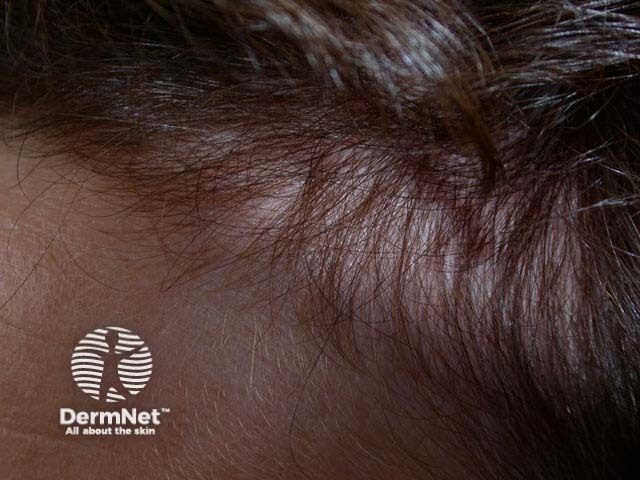Main menu
Common skin conditions

NEWS
Join DermNet PRO
Read more
Quick links
This quiz will test your diagnostic skills in diagnosing hair loss.
Diffuse hair loss from the scalp may present as an acute or subacute process without scarring, accompanied by shedding of telogen (bulb) or anagen (tapered) hairs, or more slowly as chronic thinning. In most cases, a careful history and examination reveals the cause. Where none is obvious, look for iron deficiency and thyroid disease.
A patient may present reporting one or more bald areas. This may or may not be accompanied by an inflammatory process with varying degrees of irritation, soreness, erythema, scaling and pustules and can be followed by permanent scarring (cicatricial alopecia). If scaling is present, a scraping should be arranged for mycology. It is often helpful to obtain one or more scalp biopsies from the active inflammatory edge. Refer to a dermatologist for specific diagnosis and management.
For each of the fourteen cases, study the image(s) and then answer the questions. You can click on the image to view a larger version if required.
Each case should take approximately 2 minutes to complete. There is a list of suggested further reading material at the end of the quiz.
When you finish the quiz, you can download a certificate.

Make a diagnosis
Regrowth characteristic of telogen effluvium
Outline the clinical features
Telogen effluvium most often presents in women with plenty of hair. Although they often complain vociferously of their hair coming out in handfuls, no bald patches can be seen. Tugging on the hair confirms some are loose, and most of these have a white rounded bulb at the root. Short hairs on the forehead margin is reassuring and confirms the telogen hairs are being pushed out by new anagen regrowth. In many cases, the shedding is preceded a few months' earlier by childbirth, weight loss, fever, injury or stressful event. The hair loss can be expected to slow down after a few months but becomes chronic in some cases.